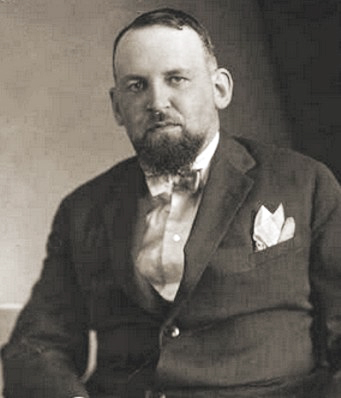While discussing the period of the Second World War, Bonjour referred to the Polish envoy in Bern, Aleksander Ładoś, who acted as chargés d'affaires from May 1940, as a "troublemaker".
The whistleblowers
Izaak Lewin during the Second World War was active in saving Jews, receiving all encrypted messages from Bern in New York. They reached him through the Consul General of the Republic of Poland, Sylwin Strakacz. He assessed that
"Sylwin Strakacz in New York and the Polish envoy in Bern, Aleksander Ładoś, should be forever recognized for their substantial help to the most unhappy among the victims of Nazism."
Today, the favourable opinion expressed by I. Lewin, and echoed by many researchers, is prevailing in assessing Ładoś’s achievements. Bern is referred to by them as "the Holocaust whistleblower center", and the head of the diplomatic mission is considered to have played a key role in the success of any rescue operations in Switzerland concerning Jews threatened with extermination which was carried out by the state apparatus of the Third Reich.
People especially devoted to the cause of saving Jews apart from A. Ładoś were his deputy Stefan Ryniewicz, vice-consul of the Republic of Poland Konstanty Rokicki, as well as Chaim Eiss (representative of the orthodox Aguda Israel party) and Abraham Silberschein (World Jewish Congress, Relico). Probably all these officials were equally privy to the rescue operations of Polish Jews.
The liaison between Jewish organizations and the Embassy was Julius Kühl, from 1940 an on-and-off employee of the legation, where he performed various functions: attaché of the legation and clerk for refugees in the Polish legation. He was also intensively active in the Polish Committee for Aid to War Victims, functioning under the Polish aegis, and looking after about 5,000 refugees, mostly Jewish, who fled to Switzerland from France and Belgium.
A secret radio station in a neutral country
Two factors were crucial for the success of rescue operations. First, the neutral nature of Switzerland, although the Swiss closely monitored and obstructed the activities of the Embassy. This may be attributed to the fact that, despite its neutrality, its dependence on the stance of the Third Reich in many matters was large, so Ładoś’s overt anti-German attitude, which was visible from the beginning of his career in Bern, was frown upon by the Swiss political elite.
Secondly, the secret radio station operating in the building of the Polish Legation was of great importance. Thanks to it, from August 1942, encrypted information on the actual scale of the mass murder of Jews in Poland was sent from occupied Poland to Bern. The transmitter and ciphers were the property of the Polish Intelligence, from May 1942 headed in Bern by Szczęsny Choynacki.
Unconventional rescue methods
The news broadcast by the radio station was forwarded to Jewish organizations. In this way, they received the first data about the Holocaust, enabling the mobilization of American Jews and undertaking a rescue operation.
In connection with the tragic news, from mid-1942, the activities of the institution were focused on rescuing and helping Jews in German-occupied European territories, including Poland. In time, 90% of the institution's funds would be channeled into this activity. The actions required secrecy and caution, due to the lack of understanding on the part of the Swiss and the presence of German agents.
These activities can certainly be called unconventional and ingenious at the same time. So what were they exactly? How were persecuted and exterminated Jews in the occupied Polish lands aided from distant Switzerland?
First of all, forged passports of Central and South American countries were sent or smuggled into the country. They were obtained illegally, mainly with funds from Jewish communities. Both the consuls of these countries and German officials participating in the scheme were bribed.
Contemporary preliminary estimates indicate that in all, about 8,000 passports were provided. So far, 3,262 people, approximately 30-40% of all passport holders, have been identified. The largest group that received them came from the towns of Polish Silesia, e.g. Będzin (847), Sosnowiec (215) or Dąbrowa Górnicza (71), as well as e.g. from Warsaw (497). Polish citizens were also the largest group among all those saved thanks to these documents – 317 people – though at the same time their death rate, despite passports, was the highest.
Thanks to the passports, some Jews managed to leave the countries occupied by the Germans, and others got recognized as interned foreigners. They were mainly issued with passports from Paraguay, El Salvador or Nicaragua, Honduras and Haiti.
The biggest Polish diplomatic campaign
In early 1944, it became evident that passports could no longer be used as protection, especially when it came to Polish citizens.
The Germans set about verifying them, which meant their holders’ inevitable death in an extermination camp. Therefore, on the initiative of A. Ładoś, the head of the Polish Ministry of Foreign Affairs took steps to make Latin American countries confirm the validity of passports in order to save the lives of their holders.
This turned into the largest Polish diplomatic campaign, which activated many political circles in the world. The following acted in this case: Kazimierz Papeé, Ambassador to the Holy See, MPs Mieczysław Chałupczyński in Bogota and Mirosław Arciszewski in Buenos Aires, Aleksy Wdziękoński, consul general in Jerusalem, and in Madrid honorary consul Wacław Dobrzyński, and chargé d'affaires Józef Potocki, .
The contribution of the Bern legation to rescuing Jews from the Holocaust is much bigger and includes more than procuring Latin American passports. Undoubtedly, its actions, and those of Jewish organizations exemplify the phenomenon of Polish-Jewish cooperation during the Second World War – all the more significant in the sea of Western Europe's indifference to the Holocaust.
